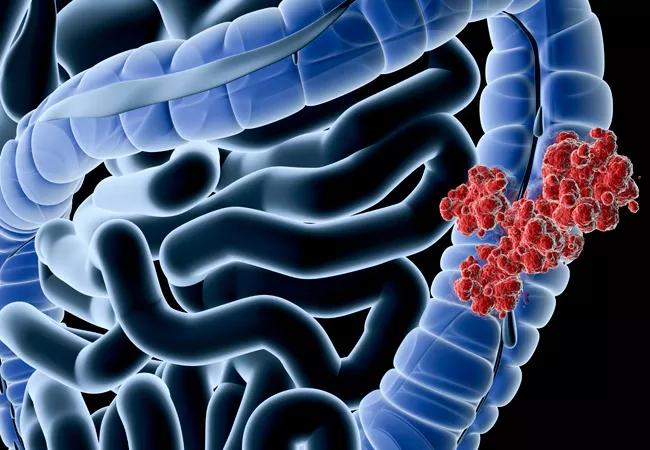Study uncovers key molecular pathways

Poor diet is associated with 80 percent of colorectal cancer cases, but the exact pathways by which diet leads to cancer are not known.
Advertisement
Cleveland Clinic is a non-profit academic medical center. Advertising on our site helps support our mission. We do not endorse non-Cleveland Clinic products or services. Policy
In a newly published study, Cleveland Clinic researchers have identified a specific molecular pathway that plays a key role in the link between a high-fat diet and tumor growth in the colon.
In the July 6 issue of Stem Cell Reports, the team showed that colon cancer stem cell growth in mice was enhanced by a high-fat, Western diet. Cancer stem cells are a subset of resilient, aggressive malignant cells that are believed to be partially responsible for spread and recurrence of cancer.
The researchers focused on the JAK2-STAT3 cellular signaling pathway, a widely studied pathway known to promote tumor growth. When the JAK2-STAT3 pathway was blocked, the spike in cancer stem cell growth caused by the high-fat diet declined, providing more insight into how this pathway is linked to diet-related cancer. Researchers anticipate that pinpointing the exact mechanism can lead to the development of therapeutics to counteract the negative effects of a Western diet on colorectal cancer.
“We have known the influence of diet on colorectal cancer. However, these new findings are the first to show the connection between high-fat intake and colon cancer via a specific molecular pathway,” says colorectal surgeon Matthew Kalady, MD, co-author of the study and Co-Director of the Cleveland Clinic Comprehensive Colorectal Cancer Program. “We can now build upon this knowledge to develop new treatments aimed at blocking this pathway and reducing the negative impact of a high-fat diet on colon cancer risk.”
Advertisement
The team analyzed human colorectal cancer-free survival data in the Cancer Genome Atlas and evaluated primary and metastasized colorectal cancer specimens via microarray analysis. They further verified the link between high-fat diet and stem cell maintenance in obesity-resistant mice.
“These findings also provide a new way in which cancer stem cells are regulated and provide insight into how environmental influences, such as diet, can alter cancer stem cell populations in advanced cancers,” says Justin D. Lathia, PhD, Associate Professor in the Lerner Research Institute’s Department of Cellular and Molecular Medicine and co-author of the study.
Senior author of the study was the late Noa Noy, PhD, and first author was Sheelarani Karunanithi, PhD. The laboratories of Ofer Reizes, PhD, Justin D. Lathia, PhD, and Dr. Kalady participated in the study. This work was supported by National Institute of Health grant R01DK088969.
Advertisement
Advertisement

First-of-its-kind research investigates the viability of standard screening to reduce the burden of late-stage cancer diagnoses

Global R&D efforts expanding first-line and relapse therapy options for patients

Study demonstrates ability to reduce patients’ reliance on phlebotomies to stabilize hematocrit levels

A case study on the value of access to novel therapies through clinical trials

Findings highlight an association between obesity and an increased incidence of moderate-severe disease

Cleveland Clinic Cancer Institute takes multi-faceted approach to increasing clinical trial access 23456

Key learnings from DESTINY trials

Overall survival in patients treated since 2008 is nearly 20% higher than in earlier patients